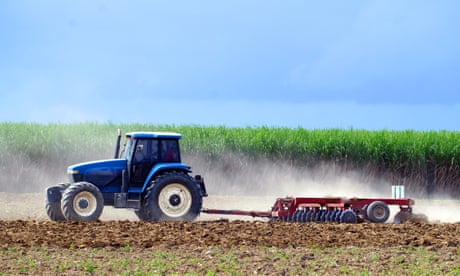- by foxnews
- 08 Apr 2025
‘Everybody’s panicking’: Croppers react to likely third La Niña drenching
‘Everybody’s panicking’: Croppers react to likely third La Niña drenching
- by theguardian
- 18 Aug 2022
- in news

The weather event that flooded northern parts of the state earlier this year has increased the chance of above-average rainfall and could "be the end of some farmers", according to Tweed cane grower Robert Quirk.
"Coming up to the middle of September, it's saying that it's going to be reasonably dry. So everybody's panicking, and I mean really panicking, to try to get their crops planted," he said.
Quirk said his farm was yielding 40% lower than his estimates for the year. This, coupled with flood-related machinery losses, has put many farmers in a difficult financial position.
He said the current flood relief package available to farmers in NSW fails to consider how cash-strapped many growers really are. Currently, flood-affected farmers are able to claim $25,000 upfront and then claim more by providing receipts for relevant purchases.
"Most of these people, if they're successful in their application, won't have the resources to spend that money to get the receipts necessary to access more support," he said.
According to Quirk, raising the upfront funds available - or restructuring the grant to be more of a loan - would go a long way towards helping farmers in the region get ahead. He echoed the push to review the grant processes by state MP for Lismore, Janelle Saffin.
On the other side of the Great Dividing Range at Boggabri, the story was largely the same.
Local grain farmer Pete Mailler said news of a possible wet season approaching was "alarming", particularly after the "worst planting season" he'd experienced in 25 years.
"The most expensive thing we do is plant. The second most expensive thing we do is harvest.
"If you've got to replant, or your harvest doesn't go exactly to plan, that's a big cost. This year we have replanted 40% of our crops, which I've never had to do before."
Mailler said the prospect of more wet weather "significantly increased" the complexity and harvesting risk that farmers faced. Having already lost a quarter of a million dollars last year during a wet harvest season, he hoped the following season would provide better conditions.
"It's really the increasing frequency of volatile weather that is very hard to manage," he said.
"If the average just moved, and we just got linearly hotter years, for example, we can work with that. But our problem is the constant change from one year to the next; we don't know whether it's going to be a heatwave or a flood, or no rain or too much rain, or whatever it happens to be."
Mailler said most farmers in the area were still more optimistic in the wet than in the dry, but added they had mostly avoided the more catastrophic effects of flooding.
James Stacey, a barley and vegetable grower in South Australia, echoed those comments, saying he would take a "rainy season over drought any day".
Mailler said the possibility of increased east coast rainfall would mean affordable water going forward as the Murray River and groundwater were replenished.
"We're going to struggle if it comes," Quirk said.
"If it's correct, it's going to be devastating. We've had the biggest kick in the backside you could imagine.
"To have another one on top of it could be the end of some farmers."
- by foxnews
- descember 09, 2016
Ancient settlement reveals remains of 1,800-year-old dog, baffling experts: 'Preserved quite well'
Archaeologists have recently unearthed the remarkably well-preserved remains of a dog from ancient Rome, shedding light on the widespread practice of ritual sacrifice in antiquity.
read more


